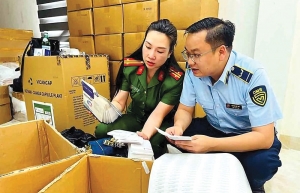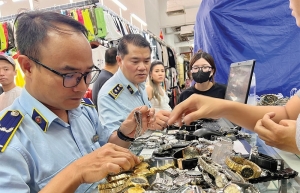INTERNATIONAL INVESTMENT
AND PORTAL
Authorities have made notable progress in their attempts to curb the scourge of counterfeit goods in Vietnam. In late May, a string of major counterfeit operations were busted across the country. Authorities in Hanoi uncovered a ring specialising in the production and distribution of fake pharmaceuticals, dietary supplements, and medical devices. Over 100 tonnes of counterfeit goods were seized, and two alleged ringleaders were arrested.
Meanwhile, in the Mekong Delta province of Long An, an inter-agency task force confiscated nearly 25 tonnes of powdered milk that was believed to be causing intellectual property infringement and lack of documentation.
These high-profile cases have prompted the prime minister to urge ministries and local authorities to intensify enforcement, eliminate regulatory overlaps, and propose new legislation to address long-standing loopholes in market management.
“You can’t smuggle or produce hundreds of tonnes of counterfeit goods without warehousing, transport, and a sales network. If authorities are unaware, then there’s either a lack of will or corruption at play,” PM Chinh stated during a government meeting in May. He called for strict disciplinary action against any officials found to be negligent or complicit.
At the same time, platforms are coming under increased pressure to step up oversight. According to the Ministry of Industry and Trade (MoIT), over 33,000 counterfeit products and more than 11,000 violating online storefronts were removed from e-commerce platforms in the first half of 2025 alone.
Nguyen Hai Ninh, deputy director of the Department of E-commerce and Digital Economy under the MoIT, confirmed that the upcoming amended Law on E-Commerce will mandate seller identification, allowing authorities to trace sellers and tax liabilities.
“Many sellers shut down one store and immediately reopen another. With proper identification, enforcement becomes feasible,” he said.
The new law will also require foreign platforms operating in Vietnam to register a legal entity or appoint an authorised representative domestically, ensuring accountability for counterfeit goods and consumer disputes. “These representatives must be held accountable before state agencies and consumers,” Ninh added.
In addition to legal reforms, authorities are encouraging the adoption of digital tools for product traceability, and consumer education campaigns are being strengthened to raise awareness of the risks associated with counterfeit goods. Nguyen Binh Minh, a member of the Executive Committee of the Vietnam E-commerce Association, noted that fully controlling product authenticity from end to end is a significant challenge due to the scale and constantly evolving nature of e-commerce.
According to Minh, determining the platform’s shared responsibility is also difficult, particularly in evaluating the severity and impact of a seller’s violations.
“Sometimes even the sellers themselves are unaware they’re dealing with counterfeit goods,” Minh explained. “That makes it even harder for platforms to monitor or guarantee the authenticity of what is being sold.”
The MoIT has also increased cooperation with major platforms to establish clearer reporting mechanisms and faster response protocols when violations are detected.
Legal experts have welcomed these efforts, but emphasised that without institutional reform, enforcement may still be hampered. Lawyer Mai Thi Thao warned that the widespread presence of counterfeit products on e-commerce platforms reflects a deeper issue of lax oversight and inadequate accountability from certain platforms in ensuring product quality.
“We have received numerous complaints from businesses whose brands have been impersonated or undercut by counterfeit sellers, causing severe damage to their reputation and revenues,” Thao said. “Existing laws – such as those on commerce and consumer protection – assign e-commerce platforms a proactive role in screening, alerting, and addressing violations. However, in reality, that level of proactivity remains significantly lacking.”
Lawyer Le Hong Hien pointed out that Vietnam’s Penal Code already contains provisions to punish public officials for corruption or dereliction of duty. “In practice, disciplinary action is rare, often ending in mere warnings or internal reviews. This erodes public trust and emboldens violators,” he said.
Moreover, fragmented enforcement structures have led to overlaps and a lack of clear responsibility. A single case of counterfeit production may involve multiple agencies – such as market surveillance, customs, and health authorities – but often no single body is clearly accountable.
 Crackdown increases on fake drugs
Crackdown increases on fake drugs
The availability of counterfeit and poor-quality pharmaceuticals is becoming more serious than ever in the local market, with more violations being revealed by authorities.
 Penalties to tighten on fake production
Penalties to tighten on fake production
As Vietnam intensifies efforts to protect consumers, the Ministry of Industry and Trade is putting forward a bold proposal to strengthen penalties against the production and trade of counterfeit goods.



















